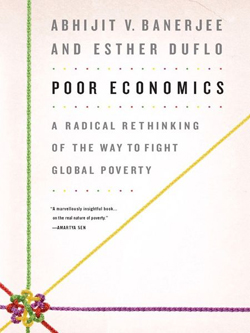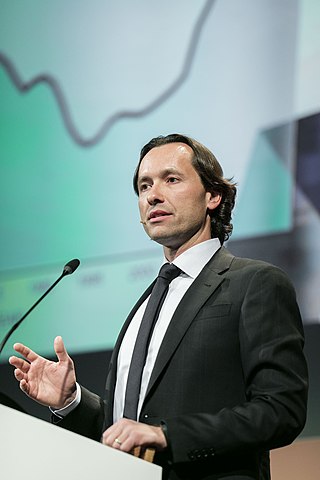An advance market commitment (AMC) is a promise to buy or subsidise a product if it is successfully developed. AMCs are typically offered by governments or private foundations to encourage the development of vaccines or treatments. In exchange, pharmaceutical companies commit to providing doses at a fixed price. This funding mechanism is used when the cost of research and development is too high to be worthwhile for the private sector without a guarantee of a certain quantity of purchases.

Michael Robert Kremer is an American development economist currently serving as University Professor in Economics at the University of Chicago and Director of the Development Innovation Lab at the Becker Friedman Institute for Research in Economics. Kremer formerly served as the Gates Professor of Developing Societies at Harvard University, a role he held from 2003 to 2020. In 2019, Kremer was jointly awarded the Nobel Memorial Prize in Economic Sciences, together with Esther Duflo and Abhijit Banerjee, "for their experimental approach to alleviating global poverty."

Esther Duflo, FBA is a French-American economist currently serving as the Abdul Latif Jameel Professor of Poverty Alleviation and Development Economics at the Massachusetts Institute of Technology (MIT). In 2019, she was jointly awarded the Nobel Memorial Prize in Economic Sciences alongside Abhijit Banerjee and Michael Kremer "for their experimental approach to alleviating global poverty".
Innovations for Poverty Action (IPA) is an American non-profit research and policy organization founded in 2002 by economist Dean Karlan. Since its foundation, IPA has worked with over 400 leading academics to conduct over 900 evaluations in 52 countries. The organization also manages the Poverty Probability Index.

The Abdul Latif Jameel Poverty Action Lab (J-PAL) is a global research center based at the Massachusetts Institute of Technology aimed to reducing poverty by ensuring that policy is informed by rigorous, scientific evidence. J-PAL funds, provides technical support to, and disseminates the results of randomized controlled trials evaluating the efficacy of social interventions in health, education, agriculture, and a range of other fields. As of 2020, the J-PAL network consisted of 500 researchers and 400 staff, and the organization's programs had impacted over 400 million people globally. The organization has regional offices in seven countries around the world, and is headquartered near the Massachusetts Institute of Technology in Cambridge, Massachusetts.

Dean Karlan is an American development economist and social entrepreneur currently serving as chief economist of the United States Agency for International Development. Alongside his role at USAID, he is the Frederic Esser Nemmers Distinguished Professor of Economics and Finance at Northwestern University where, alongside Christopher Udry, he co-directs the Globe Poverty Research Lab at the Kellogg School of Management.
Jonathan Zinman is a professor of economics at Dartmouth College and a research affiliate at the New Haven-based research outfit Innovations for Poverty Action and the Massachusetts Institute of Technology-based Abdul Latif Jameel Poverty Action Lab. Formerly an economist at the Federal Reserve Bank of New York, Zinman is currently a visiting scholar at the Federal Reserve Bank of Philadelphia and Fellow at the Federal Deposit Insurance Corporation Center for Financial Research. Zinman is also a member of the Behavioral Finance Forum and a Research Advisory Board member of stickK, a web-based start-up that enables users to make commitment contracts in order to reach their personal goals.

Stefan Nicolaas Dercon,, is a Belgian-British economist and a Professor of Economic Policy at the Blavatnik School of Government and the Department of Economics at the University of Oxford. He is also the Director of the Centre for the Study of African Economies.

The International Growth Centre (IGC) is an economic research centre based at the London School of Economics, operated in partnership with University of Oxford's Blavatnik School of Government.
The Center for Effective Global Action (CEGA), earlier known as the Center of Evaluation for Global Action, is a research network based at the University of California that advances global health and development through impact evaluation and economic analysis. The Center's researchers use randomized controlled trials and other rigorous forms of evaluation to promote sustainable social and economic development around the world.

Poor Economics: A Radical Rethinking of the Way to Fight Global Poverty (2011) is a non-fiction book by Abhijit V. Banerjee and Esther Duflo, both professors of Economics at Massachusetts Institute of Technology (MIT) and Nobel Memorial Prize in Economic Sciences laureates. The book reports on the effectiveness of solutions to global poverty using an evidence-based randomized control trial approach. It won the 2011 Financial Times and Goldman Sachs Business Book of the Year Award.

Edward "Ted" Andrew Miguel is an American development economist currently serving as the Distinguished Professor of Economics and Oxfam Professor of Environmental and Resource Economics at the University of California, Berkeley. He is the founder and faculty co-director of the Center for Effective Global Action (CEGA), a Berkeley-based hub for research on development economics.
Christopher Blattman is a Canadian-American economist and political scientist working on conflict, crime, and international development. He is the Ramalee E. Pearson Professor of Global Conflict Studies at the University of Chicago's Harris School of Public Policy Studies and The Pearson Institute for the Study and Resolution of Global Conflicts. He is active on Twitter as well as an early blogger on international economics and politics. He is the author of Why We Fight: The Roots of War and the Paths to Peace, published by Viking Press in 2022.
Ahmed Mushfiq Mobarak is a Bangladeshi economist and a professor of economics at Yale University. He is a co-chair of the Abdul Latif Jameel Poverty Action Lab's (J-PAL) Urban Services Initiative and its Environment and Energy sector, as well as the lead academic for Bangladesh at the International Growth Centre (IGC). His research interests concentrate on environmental issues in developing countries.
Tavneet Suri is a Kenyan development economist currently serving as the Louis E. Seley Professor of Applied Economics at the MIT Sloan School of Management. She is a member of the executive committee of the Abdul Latif Jameel Poverty Action Lab, and a faculty research associate at the National Bureau of Economic Research. Her research focuses on technology adoption and usage in Sub-Saharan Africa.
Emily Louise Breza is an American development economist currently serving as the Frederic E. Abbe Professor of Economics at Harvard University. She is a board member at the Abdul Latif Jameel Poverty Action Lab, and an affiliated researcher at the International Growth Centre and National Bureau of Economic Research. Breza's primary research interests are in development economics, in particular the interplay between social networks and household finance. She is the recipient of a Sloan Research Fellowship.
Oeindrila Dube is an economist and political scientist serving as the Philip K. Pearson Professor of Global Conflict Studies at the University of Chicago, Harris School of Public Policy. She is a faculty research fellow at the National Bureau of Economic Research and co-director of the Crime, Violence, and Conflict Initiative at the Abdul Latif Jameel Poverty Action Lab. Her research examines the political economy of conflict and development, with a regional focus on Africa and Latin America.

Evidence Action is an American non-profit organization founded in 2013 that scales cost-effective development interventions with rigorous evidence supporting their efficacy. The organization operates four main programs: the Deworm the World Initiative, Safe Water Now, Equal Vitamin Access, and Syphilis-Free Start. It also operates an Accelerator program, whereby new development interventions are screened and scaled according to efficacy. Vox Media has described Evidence Action as taking a "VC approach to development work".

Lisa A. Gennetian is an American applied economist focused on behavioral economics, child development, specifically child poverty, parent engagement and decision making, and policy and social investment considerations. She is the Pritzker Professor of Early Learning Policy Studies at Duke University's Sanford School of Public Policy. Gennetian is associated with the Duke University Center for Child and Family Policy, Duke University's Population Research Institute (DuPRI), the Abdul Latif Jameel Poverty Action Lab and the National Bureau of Economic Research, Children's Program. She has served on the editorial board of the Child Development journal.

Katharina Hauck is a British economist who is a professor and deputy director of the Abdul Latif Jameel Institute for Disease and Emergency Analytics at Imperial College London. Her research concentrates on the economics of infectious diseases and how public health interventions and pandemic preparedness impact economies.











